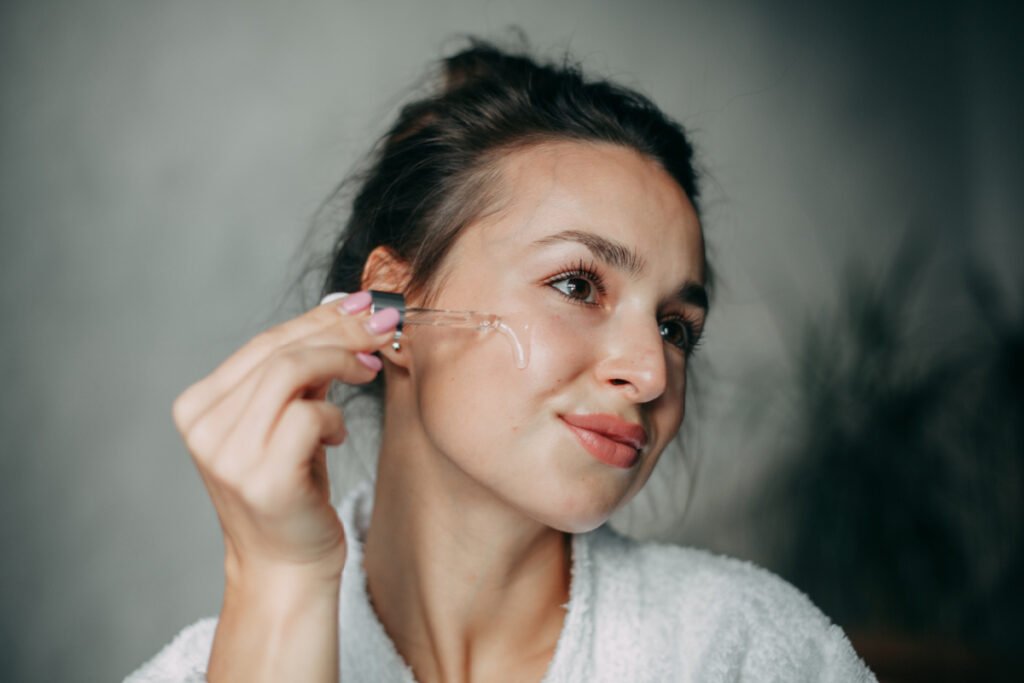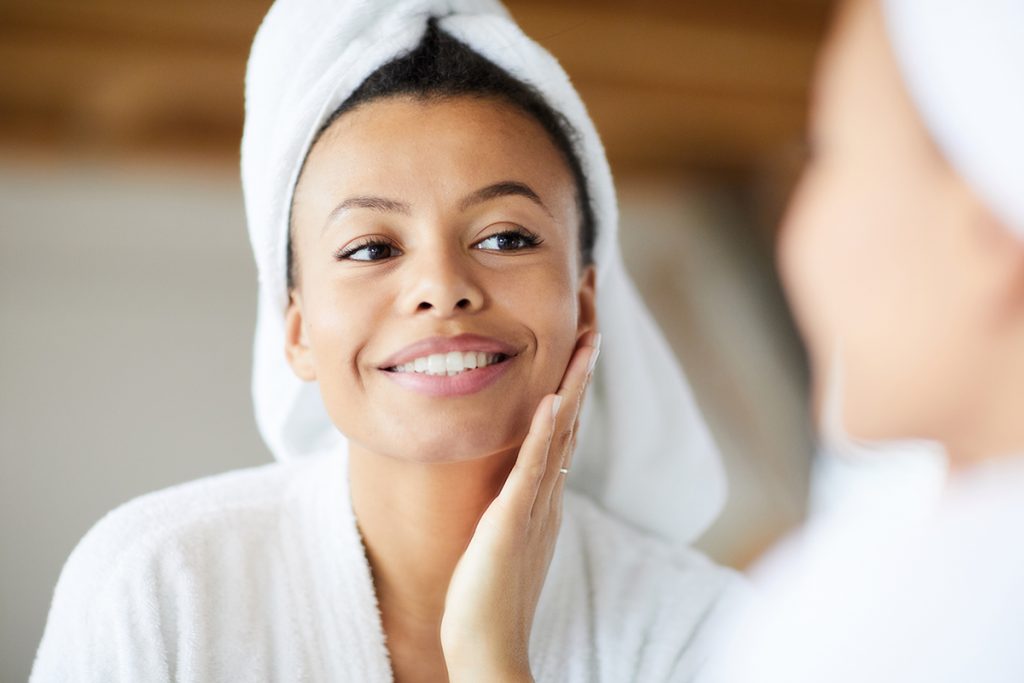How to Create the Best Skincare Routine for Your Skin (and Why It’s Important!)

Diving into the skincare world can be intimidating for beginners—the overwhelming number of products, conflicting advice, and ever-changing trends can leave you scratching your head.
Here, the expert Reading, PA dermatology team at Berks Plastic Surgery help simplify creating a skincare routine for newcomers with the lowdown on the essential steps to unlock a radiant complexion.
Why is it so important to have a skincare routine?

Physician-only skincare products can help repair existing skin problems and prevent future concerns from forming. Plus, a good preventative skincare routine makes every professional skincare treatment you receive (like chemical peels!) more effective.
Your skin’s appearance is the best indicator of its health. Your 30s and 40s are a great time to upgrade your skincare routine, and aesthetic skincare professionals like our dermatology physician assistants or licensed aestheticians can help you choose the best skincare products for your skin type. Different products target specific skin concerns, such as fine lines, age spots, and pigmentation irregularities, to help you achieve healthy, more radiant skin much faster than drugstore products can provide.
Start with the basics and work your way up
To get started, identify your skin’s greatest needs. Is it hydration, exfoliation, brightening, or smoothing? Maybe it’s improving fine lines and wrinkles or reducing scarring and discoloration? Do you want to address conditions like acne, rosacea, or psoriasis? Each need will have a slightly different treatment plan—fortunately, many procedures and products can address numerous issues simultaneously.
Find a good cleanser
A cleanser is the foundation of your skincare routine. The right cleanser can help unclog pores, prevent breakouts, and promote a clear, balanced complexion. Choose a cleanser formulated for your specific skin type (oily, dry, combination, or sensitive) with gentle, non-irritating ingredients that won’t strip the skin of its natural oils.
Be cautious of harsh chemicals such as sulfates, and look for cleansers with hydrating ingredients or soothing botanical extracts to maintain your skin’s moisture barrier and leave it feeling nourished and refreshed.
Use a good daily SPF
Including SPF in your daily skincare routine is essential for maintaining healthy skin. Sunscreen shields your skin from harmful UV rays and helps prevent premature aging, sunspots, and skin cancer.
You can choose between a chemical or a mineral sunscreen. Mineral sunscreens contain active ingredients like zinc oxide and titanium dioxide and work by sitting on top of the skin and physically blocking UV rays. They are generally well-tolerated by sensitive skin and offer immediate protection upon application.
Chemical sunscreens contain ingredients such as avobenzone, octinoxate, and oxybenzone, which absorb UV rays, convert them into heat, and release the heat from your body. Chemical sunscreens tend to be lighter in texture and may blend into your skin more easily. Whichever type you choose, make sure it is a product you love applying, so you will be more inclined to use it daily!
Exfoliate, but don’t over-do it
Cleansers alone often aren’t enough to remove dead skin cells and other pore-clogging impurities in the skin, so you’ll need to have a high-quality exfoliator in your regimen. Without regular cell turnover, buildup can lead to a dull complexion, uneven texture, and clogged pores.
Chemical exfoliants help remove the buildup of dead skin cells on the skin’s surface to reveal fresh, smoother skin. Chemical exfoliants are also especially beneficial for acne-prone skin, as keeping pores clear reduces the occurrence of breakouts.
There are several popular chemical exfoliants commonly found in skincare products:
- Alpha Hydroxy Acids (AHAs). AHAs are water-soluble acids that gently exfoliate the skin’s surface to remove dead skin cells and improve skin texture. Common AHAs include glycolic, lactic, mandelic, and citric acids.
- Beta Hydroxy Acid (BHA). BHA is oil-soluble and is effective at penetrating pores and unclogging them. It is ideal for acne-prone and oily skin types to reduce breakouts and control excess oil production. Salicylic acid is the most common BHA used in skincare.
- Enzymes. Enzymes are derived from fruits such as papaya (papain) and pineapple (bromelain) and work by breaking down the protein bonds that hold dead skin cells together, gently sloughing off the top layer of skin for a smoother complexion.
- Polyhydroxy Acids (PHAs). PHAs (gluconolactone and lactobionic acid) are a newer generation of milder chemical exfoliants than AHAs. They provide similar exfoliating benefits but are less likely to cause irritation or sensitivity.
Chemical exfoliants should be used according to the instructions and in moderation to avoid over-exfoliation or irritation. Consulting with a qualified aesthetician or dermatologist is also recommended, especially for sensitive or reactive skin.
Lather on the moisturizer
Moisturizer is a crucial part of any skincare routine; it provides a protective barrier to reduce moisture loss and locks in the skin’s natural oils to keep your skin supple, nourished, and healthy-looking. Moisturizers also often contain key ingredients like antioxidants, peptides, and vitamins, offering added benefits such as slowing the aging process, reducing inflammation, and promoting collagen production. Maintaining an appropriate hydration level can even balance oil production in oily skin types.
Consistency is key; your at-home skincare routine should be practiced daily to protect your skin and see visible improvement.
Don’t just rely on products for good skin
Just like you visit the dentist for a professional cleaning twice a year, regular skincare treatments from an aesthetician or medical injector can refresh your complexion and address many common skin concerns.
- BOTOX® or Daxxify® injections soften expression-based lines and wrinkles. “Preventative Botox” is popular for younger patients who want to prevent them from forming in the first place to maintain a naturally youthful appearance as they age.
- Juvéderm® and Restylane® dermal fillers can add or restore volume to define and enhance your facial features, such as the cheeks, jawline, under eyes, or for lip enhancement. They may also be used to subtly lift the skin and diminish lines and wrinkles
- Hydrafacial MD® exfoliates, extracts, and nourishes your skin using comfortable suction and a steady stream of water to unclog your pores, boost cell renewal, and infuse your skin with personalized serums to target specific skin concerns.
- Laser skin treatments use controlled laser energy to stimulate collagen and elastin production to rejuvenate and tighten the skin. Laser treatments are fully customizable and can significantly improve skin health and appearance, effectively reducing wrinkles, acne scars, pigmentation, and other signs of aging for a smoother, more youthful complexion.
If you’d like to learn more about skin treatments or how to curate the perfect skincare regimen catered to your personal skin concerns, we are here to help! We will happily sit down with you, listen to your goals, and help design a skincare and non-surgical treatment program that targets your skin concerns. Call us at (610) 320-0200 or fill out our contact form to receive a call back from our friendly patient coordinator.
Our Reading medspa is overseen by board-certified plastic surgeon Dr. Brian K. Reedy, and our licensed providers stay up to date on the latest treatments and technologies to achieve safe, optimal results for our patients.
